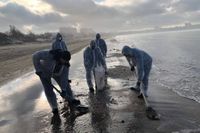Beaches in Anapa and the Temryuk district have been deemed unsuitable for swimming due to safety violations, following a significant oil spill incident. On April 18, 2025, Anna Popova, the head of Rospotrebnadzor, conveyed this alarming news to journalists, stating that 141 beaches in Anapa and nine in Temryuk have failed to meet pollution and sanitary-hygienic standards.
As a result, the resort season in these areas may not open as planned. However, Popova reassured the public that the recreational areas can still be utilized, provided that beach access and sea water are not involved, as the quality of drinking water, food, and air remains normal.
According to Popova, there are no risks associated with recreation on the beaches of the Krasnodar Territory from Novorossiysk and further east. "This area is considered low-risk, but throughout the summer, we will conduct thorough monitoring to prevent any violations," she added.
The oil spill, which primarily affected the shores of Anapa, was caused by the wreck of tankers Volgoneft-212 and Volgoneft-239, transporting mazut that sank in the Kerch Strait during a storm on December 15, 2024. This incident has raised concerns about the safety of the beaches, leading to the decision to prohibit swimming.
Earlier this week, authorities announced the opening of the tourist season in Crimea, Sevastopol, and the Krasnodar Territory, excluding Anapa and Temryuk. Tourists who have been forced to cancel their vacations in these areas due to the oil spill will receive full refunds for their hotel reservations.
In light of the situation, Ilya Umansky, President of the Russian Union of Travel Industry (RST), has predicted a further decrease in hotel prices in Anapa. He noted that prices had already been declining for about a month due to the approaching season, but the official announcement from the authorities is expected to accelerate this trend.
Umansky emphasized that Crimea is the only destination capable of absorbing the demand that would have gone to Anapa, and this shift is already underway. The Crimean authorities and tourism businesses are reporting a 50% increase in summer bookings, indicating a significant redistribution of tourist traffic.
He highlighted that Anapa is one of the most developed resorts in Russia in terms of infrastructure, boasting numerous quality sanatoriums that can offer appealing packages to tourists regardless of beach conditions. Anapa is also known as the birthplace of the Russian "all-inclusive" concept, featuring a high concentration of hotels with comprehensive vacation programs and entertainment options.
Moreover, the resort has many facilities with swimming pools and water parks, which can still provide attractive services to visitors. However, Umansky pointed out that a considerable portion of Anapa's accommodation is comprised of small hotels and guest houses, which typically cater to tourists seeking beach access. Most of these smaller establishments only operate during the summer season, and many may not open this year due to the current circumstances.
"The situation in larger hotels with developed infrastructure will likely be better this season than in smaller ones, but that doesn’t mean it will be good. Beach restrictions will undoubtedly have negative consequences for businesses," Umansky stated. He warned that a reduction in prices combined with a 50% occupancy rate may not ensure profitability, and many entrepreneurs might only break even to maintain their workforce.
Despite the challenges posed by the beach closures, Umansky reminded the public that Anapa has evolved into a year-round resort. During the upcoming May holidays, hotels in the area are reportedly as full as they were during the same period last year. Additionally, alternative tourism options, such as excursions and wine tourism, are gaining traction in the region.
Popova reiterated that while 141 beaches in Anapa and nine in Temryuk do not meet sanitary and hygienic standards and cannot be used for the summer recreational campaign, visitors can still enjoy recreational activities in the area without swimming in the sea.
As the summer season approaches, the impact of the oil spill on Anapa's tourism industry remains a pressing concern. With many tourists redirected to Crimea and other regions, the future of Anapa's beach resorts hangs in the balance, as local businesses grapple with the repercussions of safety violations and shifting tourist preferences.






